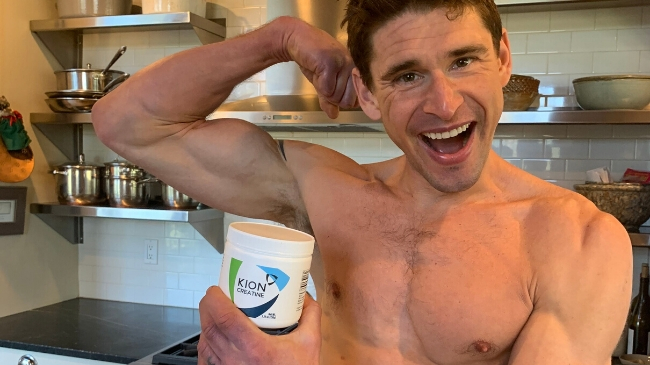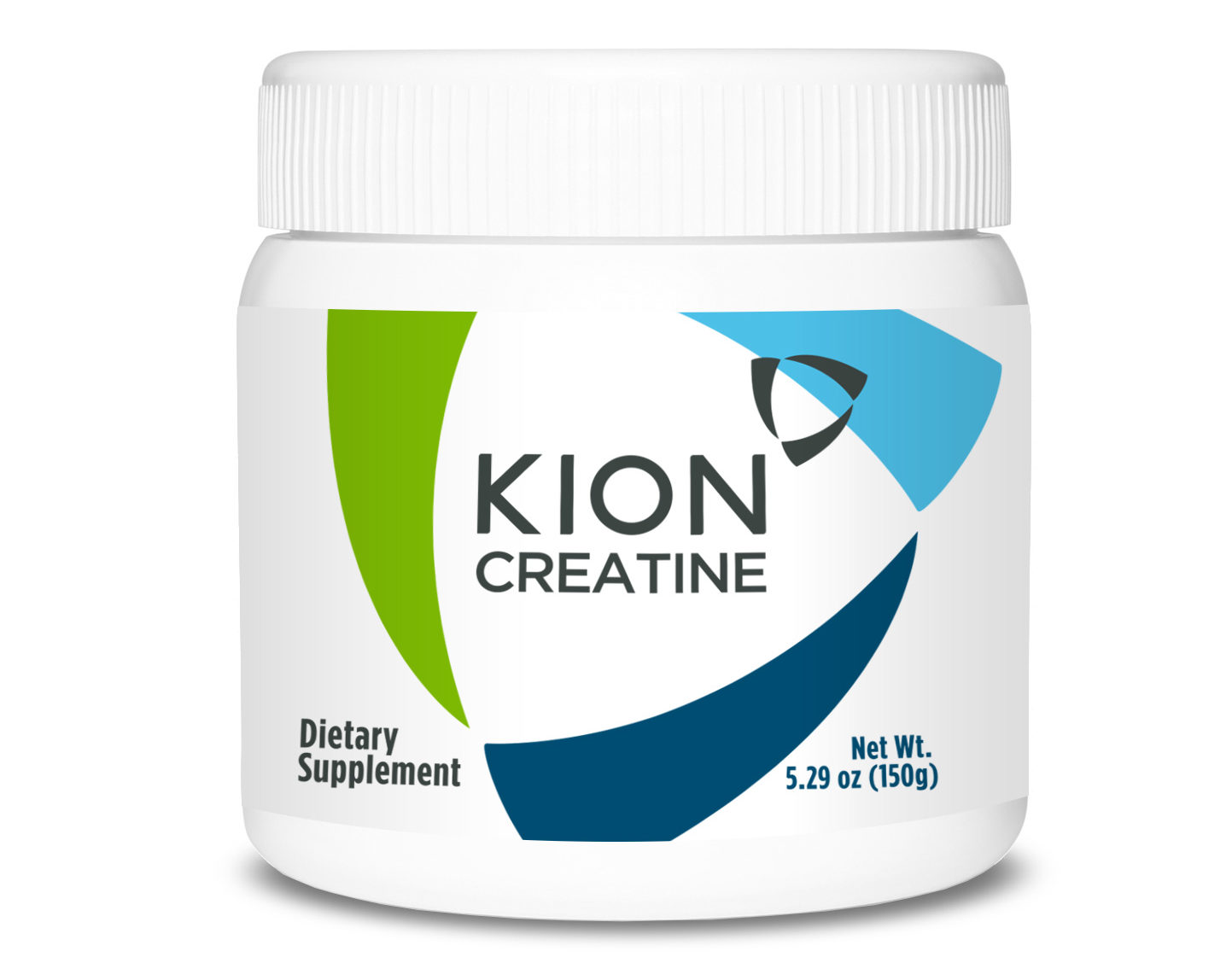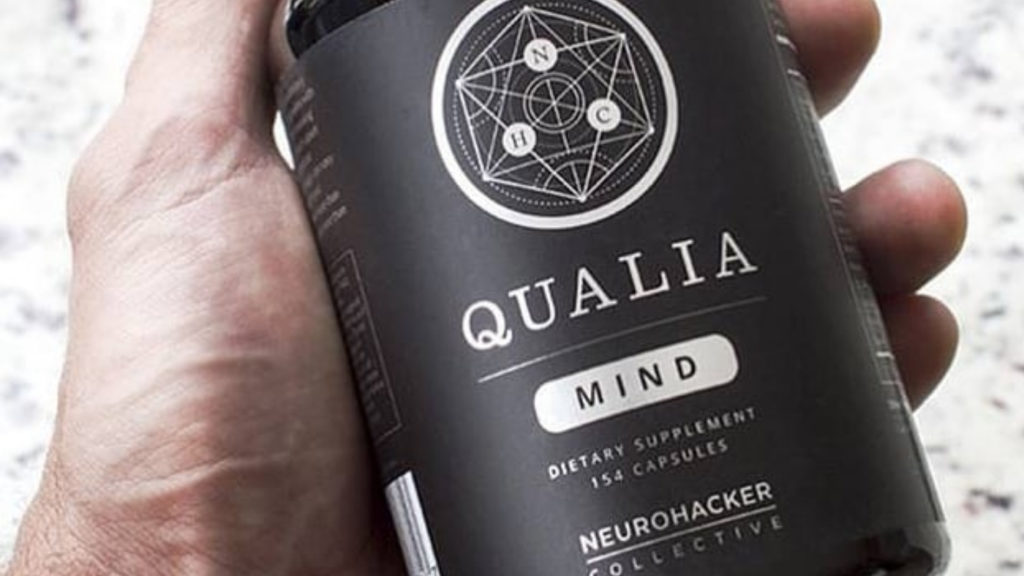March 17, 2020
You've no doubt heard of creatine—one of the most popular and well-researched supplements that exists for muscle-building, cognition, endurance, recovery, and much more.
Creatine is a supplement I recommend to just about everyone I speak with who asks what basic supplements they should be on to cover as many bases as possible. (The other base supplements that nearly everyone benefits from that I typically recommend, in addition to creatine, are a multi-vitamin, a fish oil, and some kind of greens powder.)
So, it's no surprise that I'm often asked all sorts of questions about creatine…
- How much creatine should I take?
- What's the best form of creatine?
- Is creatine OK for your kidneys?
- Does creatine cause bloating or cramping?
- Is creatine only for athletes?
- And much more…
I personally have a fairly long history (over 20 years) of using creatine on a near-daily basis, so buckle in for a deep dive into what I consider to be one of the most effective supplements that I'd recommend just about anyone take.
In this article, you'll discover more about what creatine exactly is; little known uses for creatine; whether there are any issues when it comes to kidney health, bloating, cramping, or water retention; and exactly how to use creatine as a nootropic, muscle gain agent, endurance support supplement, and much more.
What Is Creatine, Exactly?
The first time I tried creatine was my junior year of college. I was a fledgling bodybuilder and also working on my master's degree in exercise physiology and biomechanics at the University of Idaho. Creatine had already been championed in much of my physiology and nutrition coursework as what most people readily recognize it for: enhancement of strength and power.
But during one particular class, I remember professor Dennis Dolny teaching us bright-eyed, bushy-tailed students about the benefits of creatine, a compound that—even at that point, nearly 20 years ago—had been researched for its effects on mental acuity, assisting with glycogen sparing during endurance exercise, staving off muscle loss (sarcopenia) in seniors, enhancing cognitive function, supporting testosterone levels, stabilizing blood glucose, and plenty more.
I was sold. I had to try this stuff.
I began with the only form I could actually afford as a poor college student: a basic, pure creatine monohydrate.
The results were shocking. Despite my meager bodybuilding budget only allowing me to use caffeine, protein drinks, and just 5 g of creatine each day, my body surprisingly and quickly transformed, and did so quite dramatically. From a natural “skinny-guy-hard-gainer” weight of 180, I gradually gained 35 pounds of muscle over the next year and a half—transforming myself into a 215lb, 3% body fat beast.

Ever since then, despite stepping away from bodybuilding (which I now consider to be one of the unhealthier, more selfish, and narcissistic fitness activities one can compete in!) I've remained a huge fan of creatine and, as I discuss in a recent supplements article and supplements podcast, creatine is still a daily staple in my personal supplement regime, and something most of my clients use on a daily basis for the reasons you'll discover in this article.
So what is creatine, exactly?
Creatine (molecularly categorized as “α-methyl guanidine-acetic acid) is simply a peptide, which is a compound consisting of two or more amino acids linked in a chain—in this case, L-arginine, glycine, and methionine. Creatine is naturally produced in your body in small amounts. Your kidneys use glycine and arginine to create guanidine-acetic acid (GAA) which is then transported via your bloodstream to your liver where it is then converted into creatine. From there, the creatine is once again carried around by your bloodstream, primarily to skeletal muscle, but also to several other target tissues (one notable one being your brain, which is why I consider creatine to also be a kind of natural “smart drug”).
Just like in humans, creatine is also produced naturally in other animals—which is why consuming animal protein is an excellent way to increase your creatine intake and why, as you'll find in this article, supplementation of creatine for vegans and vegetarians—along with any athlete or exercise enthusiasts not eating copious amounts of muscle meat—should be a complete non-negotiable.
As you can see from the table below, creatine levels can vary significantly by animal. Generally speaking though, you'd have to consume approximately two pounds of meat per day to get adequate creatine levels, and if you exercise regularly and intensely, are elderly, or eat a primarily plant-based diet, chances are you're not getting enough creatine from your diet alone.
| Food | Creatine Content |
|---|---|
| g/lb | |
| Cod | 1.4 |
| Beef | 2.0 |
| Herring | 3.0~4.5 |
| Milk | 0.05 |
| Pork | 2.3 |
| Salmon | 2.0 |
| Shrimp | Trace |
| Tuna | 1.8 |
| Plaice | 0.9 |
| Fruits/ Vegetables | Trace |
7 Little Known Uses For Creatine
Sure, creatine is well-known in the fitness world for enhancement of strength and power, but its benefits go far beyond its use for, say, a bodybuilder, powerlifter, or football lineman.
So what are some of these lesser-known uses and benefits of creatine?
As one of the most widely studied and generally recognized as safe (GRAS) supplements that exist, creatine boasts a myriad of benefits, including alleviating brain fog, increasing cognitive performance, speeding up muscle recovery, optimizing endurance, slowing down age-related muscle loss, lowering cholesterol, increasing testosterone, promoting bone health, and much more.
Now, let's dive into a few of the most notable and well-researched effects of creatine.
1. Cognition
Creatine has been shown to reverse “brain fog” symptoms and significantly improve central executive functioning, short-term memory, choice reaction time, balance, mood state, and effort at baseline in sleep-deprived individuals.
In one double-blind study, it was reported that creatine supplementation had a nootropic effect on participants. Participants were separated into two groups, vegetarians and omnivores. Each group consumed either a placebo or 20g of creatine for five days. While memory improvements were only exhibited in the vegetarian group, creatine supplementation decreased the variability in the responses to a choice reaction-time task in both groups. In another study on vegetarians, supplementing with 5g of creatine per day was found to have a significant effect on processing speed, working memory, and intelligence.
In elderly people, a dose of 5g of creatine 4x/day was shown to aid in cognitive performance, specifically random number generation, forward number recall, spatial recall, and long-term memory tasks after just two weeks of supplementation.
Summary: If you're elderly, vegan, or vegetarian, creatine is going to be enormously helpful for your mental performance. I personally have found that this effect seems to also apply to very active individuals, exercise enthusiasts, and athletes, who all exhaust their creatine levels at a higher rate than a sedentary or average person.
2. Repairing Muscles Faster
Taking creatine before and/or after working out may help speed up muscle recovery. Significantly greater isokinetic (10% higher) and isometric (21% higher) knee extension strength during recovery from exercise-induced muscle damage was shown in the creatine group (vs. placebo) in a study of 14 male participants. In the same study, plasma creatine kinase activity was significantly lower (by an average of 84%) after 48 hrs recovery in the creatine group.
Creatine significantly lowered markers of muscle damage in a study done on eight Ironman triathletes. The athletes were randomly placed into two groups. Five days before the competition, the creatine group received creatine monohydrate plus maltodextrin and the placebo group received only maltodextrin. Creatine decreased plasma activities of creatine kinase, lactate dehydrogenase, and aldolase—and prevented the rise of glutamic oxaloacetic acid transaminase and glutamic pyruvic acid transaminase plasma activities.
Creatine supplementation was also shown to have a positive effect on the preservation of muscle mass and strength in a study of young men whose arms were immobilized by casts. The creatine group better maintained lean tissue mass, elbow flexor strength and endurance, and elbow extensor strength and endurance.
In another study, creatine supplementation was shown to provide an additive effect on blunting the rise of muscle damage markers following a repeated bout of resistance exercise. Lesser rises in serum creatine kinase activity, muscle soreness, and a lesser decrease in range of motion were all exhibited in the creatine group.
Finally, creatine supplementation has also been shown to augment post-exercise muscle glycogen storage (within the first 24 hours of supplementation) significantly, compared to placebo.
Summary: The way I personally use creatine is to simply put 5g of pure creatine monohydrate powder into my morning smoothie, or if I'm not having a smoothie, into a large mason jar of warm water. (More below on whether you need to split into multiple daily doses, but I personally don't.)
3. Strength, Power, and Endurance
Creatine is already well known for enhancing muscle strength and power, which is how it originally became popular. For example, one double-blind study examined 25 soccer players under the age of 20 and showed that creatine supplementation increased average, maximum, and minimum power values (compared with placebo). The study showed significant increases in plasma tumor necrosis factor-alpha (TNF-α) and C-reactive protein (CRP) up to one hour after acute sprint exercise in the placebo-supplemented group. The increases in TNF-α, CRP, and LDH induced by acute exercise were all reversed in the creatine group.
One study published in the Journal of Strength and Conditioning Research showed that creatine supplementation amplified muscle strength and weightlifting performance during resistance training compared to resistance training alone. The creatine group experienced an 8% greater increase in muscle strength and a 14% greater increase in weightlifting performance.
Creatine also works wonders for endurance. This is likely due to a glycogen-sparing effect, and also the assistance of the extra ATP pools made available by creatine to allow for less glycogen store depletion and more substrates available for ATP production during extended exercise. For example, creatine supplementation reduced ratings of perceived leg fatigue and heart rate as well as rectal temperature, plasma free-tryptophan (Trp), and free-Trp:tyrosine ratio in a study on 21 endurance-trained men who performed two constant-load exercise tests to exhaustion at 63 +/- 5% V(O2) max in the heat.
Another study in the Journal of Strength and Conditioning Research examined creatine's effect on aerobic and anaerobic performance in 16 elite male rowers and showed that creatine supplementation improves endurance (expressed by the individual lactate threshold) and anaerobic performance, independent of the effect of intensive endurance training.
Summary: During my Ironman triathlon competition days, I used creatine extensively and noticed significant upticks in energy and performance during longer bouts of exercise. So ultimately, this stuff is not just for swole bodybuilders. If you swim, bike, run, or do other endurance activities, creatine can be a very useful tool to get an extra edge.
4. Age-Related Muscle Loss
Several studies have shown that creatine supplementation can increase body mass and muscle strength, as well as enhance fatigue resistance in younger and older adults.
When combined with resistance training, creatine has been shown to increase lean tissue mass and improve leg strength, endurance, and average power in elderly men. Also in elderly men, it was shown to delay muscle wasting.
In another study of 28 healthy men and women over the age of 65, creatine combined with exercise increased muscle strength, weight, fat-free mass, and functional capacity with no significant side effects from treatment or exercise training. In the same study, creatine supplementation also showed a greater increase in isometric knee extension strength and greater gains in isometric dorsiflexion strength.
Yet another study examining the long-term effects of creatine supplementation in older women showed promising results. Eighteen middle-aged women were given either 5g of creatine or a placebo. At the end of the study, the creatine group experienced a greater increase in training volume, bench press, knee extension, and bicep curl performance than the placebo group. Furthermore, the creatine group gained significantly more fat-free mass, muscle mass, and were more efficient in performing submaximal-strength functional tests than the placebo group.
Summary: I've talked about strategies such as blood flow restriction training, super slow training, and even the addition of digestive enzymes when eating meat or drinking protein shakes as strategies to stave off muscle loss as you age, and creatine absolutely falls into this category.
5. Heart Health
In a randomized, double-blind, placebo-controlled trial of 18 men and 16 women with total cholesterol concentrations exceeding 200 mg/dl, study participants were given either 5g of creatine or a placebo for 56 days. Creatine and placebo were taken orally four times a day for five days and then twice a day for 51 days. The creatine group saw significant reductions in cholesterol, triacylglycerols, and very-low-density lipoprotein-C.
In another study, creatine added to a multivitamin supplement lowered inflammatory homocysteine levels, a risk factor for heart disease, in healthy people better than multivitamins alone after four weeks.
In another study, 30 healthy, but untrained, male volunteers were given either placebo or a loading dose of creatine (5g, four times a day for five days) followed by a maintenance dose (5g twice a day for 28 days) and underwent five hours of resistance training per week or remained on creatine without training. Creatine plus resistance training improved calf and forearm blood flow. (Interestingly, in the creatine group, fat-free mass, strength, and resting metabolic rate also increased!)
Summary: While I'm not fully aware of the mechanism of action via which creatine is impacting heart health, it is definitely making an impact positively on cardiovascular function and lipid profiles. I'd love to see even more research in this area, but nonetheless, it turns out to be yet another benefit of creatine dosing.
6. Testosterone
When taken alongside a 10-week resistance training program, creatine supplementation has been shown to increase testosterone levels. In a study of 33 college football players (assigned to either a placebo, creatine, or creatine plus beta-alanine group), significantly greater strength improvements were seen in the creatine and creatine plus beta-alanine groups compared to the placebo group. Additionally, creatine plus beta-alanine was shown to have the greatest effect on lean tissue accruement and body fat composition.
Another study conducted on male swimmers noted that loading with creatine (20g daily for six days) increased testosterone levels by around 15% relative to baseline.
Summary: In my presentation at the American Academy of Anti-Aging Medicine (A4M), I categorize creatine as completely crucial for guys with low testosterone, along with a few other key nutrients (such as Vitamin D, minerals, and magnesium). I wouldn't even come close to considering anything like testosterone replacement therapy unless you're first utilizing this natural, less expensive approach.
7. Bone Health
Postmenopausal women with knee osteoarthritis supplementing with creatine exhibited significant physical function improvements as well as significant improvements in lower limb lean mass and quality of life.
In another study done on rats, the potential for creatine to be used as a clinical intervention to stimulate cell growth, differentiation, and mineralization during bone repair was promising, increasing bone mineral density (BMD) in the lumbar spine with a nonsignificant trend to increase BMD in the femur (the femur appeared to be 12.3% more resistant to snapping from mechanical stress associated with increased thickness). Menopausal rats experience similar benefits for increasing phosphorus content of the bone and other biomarkers of bone health.
Summary: I think that 5g daily dose of creatine stacked with something like Kion Flex is one of the best strategies you can use to keep your joints and bones healthy.
These are only a few of the research-proven benefits of creatine. From controlling inflammation to modulating hormones to supporting healthy blood sugar levels, you can find plenty more creatine benefits on Examine's creatine research page. As you can see from my brief examples above, creatine benefits go far beyond bigger bicep or faster sprints. This molecule continues to intrigue me as I learn every day about more and more benefits it provides. Considering how inexpensive and effective creatine is, I'm hoping you're beginning to see why it's a daily staple in my own supplement protocol.
How To Use Creatine: Dosage, Timing & Cycling
First, forget everything you've ever heard about needing to load, de-load, or cycle creatine. Forget the complex protocols of taking 20g for multiple days, then tapering down, cycling on, cycling off, etc.
It's all a load of BS.
I used to do this back in the day too, but repeatedly, any studies on creatine that begin right out of the gate with 5-10g (or less in some cases) taken daily show significant benefits that seem no different (and seem to eliminate any cramping or bloating issues) compared to complex or larger loading protocols.
Yes, if you don't “load” with 20g of creatine for several days prior to tapering off to a more sane daily dose of 5g/day, it may take a bit longer for some of the benefits of creatine to set in (about two to three weeks to really start to feel a lot of the effects mentioned above), but trust me—if you skip the loading phase, you'll also skip the cramping and bloating that tend to go along with heavy, high-dose creatine use.
Sure, creatine loading can have surface-level benefits, such as enabling you to see if you respond to creatine, or slightly “speeding up” seeing some benefits by causing faster saturation of creatine in muscles. And yes, due to water retention from larger doses of creatine, you may be able to see yourself appearing to get bigger or having more full muscles, but this offers nothing more than a quick and temporary psychological benefit, often accompanied by annoying bloating or cramping.
As for cycling on and off creatine throughout the year, there’s no reason for this layer of complexity either. Creatine is one of the most well-researched supplements out there, and there have been zero negative side effects shown in those who, like me, use small doses of creatine daily for long periods of time (which I've been doing for 20 years at 5g/day!).
If you should decide you do indeed want to load/cycle creatine, it generally works like this:
- 20-25 g per day for 5-7 days
- 5 g per day for 3-4 weeks
- Take 1-2 weeks off
- Repeat
But again, I don't do or endorse that type of approach. So how do I personally take creatine?
It's very simple. I dissolve 5g of creatine monohydrate into a glass of warm water in the morning (the warm water helps to increase absorption) or simply add a 5g scoop to my morning smoothie. What can I say? I'm a creature of simplicity.
However, studies suggest that taking creatine in close proximity to when you work out helps to increase muscle mass and strength—so long as you can remember to do that. (I find if I just take it in the morning, it's one less thing to think about later on, but if I were a serious professional athlete I'd adjust and dose post-workout.) Considering I typically do some kind of morning movement protocol, it works just fine for me to take in the morning, but several high-performance athletes I know will wait until just after their hardest workout of the day to dose their creatine. Others I've known who don't mind the complexity, and want to have creatine in their bloodstream elevated for multiple daily workouts, will do 2.5g after a morning workout or movement protocol, then 2.5g after an afternoon or evening workout.
Why after? In this particular study, while muscle strength benefits were shown regardless of whether creatine was taken pre- or post-workout, greater improvements in lean tissue mass were only seen in the creatine post-workout group. In another study done on 19 male bodybuilders, it was also shown that consuming creatine immediately post-workout is superior to pre-workout in regard to body composition and strength improvements.
So, in other words, you might get more bang for your buck if you take creatine after you hit the gym; but ultimately, if you're taking 5g consistently each day, it probably doesn't matter too much—especially if you're taking creatine for goals such as heart health, testosterone, or cognition, and not necessarily for pure muscle building or repair.
Finally, there have been some claims that you can't absorb any more than 1.5-2.5g of creatine at a time, but I tend to agree with my friend Dr. Chris Masterjohn on this issue, who says:
“…I think the retention of your muscles is going to be best with creatine if you take it post-workout and if you take it with carbohydrate to stimulate insulin. But on the whole, I think that the absorption and retention is good enough that it's more a matter of how fast will you get to peak muscular creatine than it is about where you get in the long-term.
Maybe if you follow all the best procedures to absorb and retain creatine, you'll get to the 30% increase in muscular creatine in two weeks taking 5 grams a day instead of four weeks. Maybe someone who doesn't follow any best practices takes six weeks. But ten weeks later, you're probably going to be at peak effect if you just take 5 grams of creatine at a time without paying attention to all the details around absorption.”
Does Creatine Cause Bloating & Cramping?
There is a longstanding belief by some that if you take creatine, you will inevitably be left swollen with water weight and keeling over in pain mid-workout from cramps.
However, multiple studies have shown that creatine, taken at a normal dosage, does not result in such side effects.
In a 1998-2000 study of college football players, it was shown that creatine supplementation does not appear to increase cramping or injuries. The subjects were split into two groups: One group took 5g of creatine following a loading phase and the other took non-creatine containing supplements and resumed workouts/practices as normal. Injuries treated by trainers were labeled as cramping, heat/dehydration, muscle tightness, muscle strains/pulls, non-contact joint injuries, contact injuries, and illness. The incidence of all injuries was generally lower or proportional to the creatine use rate among players.
Another study found that athletes exercising in the heat exhibited no adverse effects from creatine supplementation at recommended dosages and no evidence to support the notion that creatine supplementation hinders your body's ability to dissipate heat or that it negatively affects your body's fluid balance.
So where does this creatine bloating and cramping “myth” come from?
I suspect it's the high-dose loading protocol that's an “old-school” practice of the past with creatine, particularly amongst bodybuilders and athletes. As I mentioned above, creatine should ideally be taken at the suggested dosage of 5g per day if you want to avoid bloating and cramping, which is all the more reason to skip the loading phase. I also can't overstate the importance of staying adequately hydrated while consuming creatine to avoid any bloating or cramping side effects.
Does Creatine Cause Kidney Damage?
This is another question I'm frequently asked. In people with healthy kidneys, long-term creatine supplementation has been shown to be safe. For those with kidney issues, it's best to speak with your doctor before beginning creatine supplementation.
Why are the kidneys a concern when it comes to creatine?
Your skeletal muscles, brain, and other tissues transform creatine into phosphocreatine in order to store it in your body. When your body wants to tap into these stores, one of the byproducts is creatinine. Your kidneys then excrete this creatinine, and if their function declines, so does creatinine excretion. Creatinine blood levels are commonly used to indicate kidney function so if your creatinine levels are high, it's presumed that your kidneys aren't doing their job in getting rid of the excess.
Yes, it's true that the more muscle you have, the more you use your muscle, the higher your animal protein intake is, and using a creatine supplement all result in blood levels of creatinine beyond the normal ranges. Does this necessarily mean that your kidneys aren't working properly?
The very simple answer: No.
In individuals with healthy kidney function, creatine supplementation does not deleteriously affect kidney health.
Scientific reviews on long- and short-term safety of creatine supplementation have overwhelmingly found no evidence of adverse effects on the kidneys. There's no shortage of science on this, and if you want to dive deeper you can check out the following studies:
- Effects of creatine use on the athlete's kidney.
- The effect of creatine intake on renal function.
- Side effects of creatine supplementation in athletes.
- Safety of creatine supplementation.
- Studies on the safety of creatine supplementation.
- In sickness and in health: the widespread application of creatine supplementation.
- International Society of Sports Nutrition position stand: safety and efficacy of creatine supplementation in exercise, sport, and medicine.
Finally, if you are taking creatine, and you want to test your creatinine levels to ensure they're not excessively elevated, please realize, A) Due to higher-than-normal creatine turnover, any exercise enthusiast or athlete is going to see creatinine values slightly above normal, and B) If you work out hard in the one to two days prior to testing, you're also going to abnormally elevate creatinine values, so it's best to test after a rest day or recovery weekend.
Does Creatine Cause Hair Loss?
You may have also heard that creatine supplementation can cause hair loss. This is based on just one study in which men given creatine experienced a significant increase in their blood levels of dihydrotestosterone (DHT), an androgen that could contribute to hair loss, particularly in males.
Seems pretty cut and dry, right? Well, not exactly.
In this study, even though an increase in DHT was shown, it still stayed well within the normal range. So even if creatine did increase DHT in this case, it probably wouldn't have had much more of an effect on hair loss than would have otherwise occurred. And most importantly, there have been no direct studies on what effect creatine supplementation has on hair loss.
It's also important to keep in mind that DHT is just one of many factors that can contribute to hair loss, and some are more susceptible than others to the effect DHT has on hair loss based on their genetics.
So, I wouldn't worry about hair loss either. Although, a simple 23andMe genetic test can test for the androgen receptor gene located on the X chromosome—one of the genes associated with male-pattern baldness—and elucidate if you're at higher risk for male pattern baldness, fellas.
What Is The Best Creatine?
Remember the beginning of this article (I know, it was a long time ago) where I wrote that I started taking creatine monohydrate because it was the only form I could actually afford as a poor college student?
Well, to this day, creatine monohydrate remains the most well-researched, effective, (and most affordable) form of creatine that exists, despite all the other fancy, expensive forms that are out there. Sure, creatine nitrate, creatine ethyl ester, creatine hydrochloride, and all different, expensive, fancy forms of buffered and micronized creatine may have a lot of marketing hype, but old faithful creatine monohydrate gives you everything you need. (Just make sure it's not tainted or bastardized by paying attention to the criteria I list below because even all forms of creatine monohydrate are not created equal.)
There are a plethora of reasons why monohydrate is considered the best form of creatine—most notably however is that it's been proven safe (even at higher than recommended doses) and it has far more scientific literature to back it up this claim than any other form. Of the 1,000s of studies out there on the efficacy of creatine, the majority of them have been conducted using creatine monohydrate.
Some studies even compared monohydrate to other forms of creatine, and—you guessed it—creatine monohydrate came out on top. One such study showed that performance in cyclists increased by 10% when using monohydrate, and no increase in performance was shown in those who took fancy, spendy liquid creatine.
And my favorite thing about creatine monohydrate? It's the least expensive. Because it's been around longer and lots of companies sell it, competition has made it one of the most accessible supplements out there. (You can get a 30-day supply for around 15 bucks.)
So if tons of companies are selling it, how do you sort through all the clutter to make sure you're getting the highest quality, most effective stuff out there?
Just look for a form of creatine monohydrate called Creapure®. This is the brand name for pure creatine monohydrate produced by AlzChem Trostberg GmbH in Germany. Why Creapure®?
- Creapure® is the most widely studied form of creatine and proven to be safe and effective.
- It is IFS FOOD certified, a quality standard recognized by the “Global Food Safety Initiative.”
- Creapure® is on the Cologne List®. (By using only products of the Cologne List®, athletes reduce the risk of unintentionally becoming the victims of doping.)
- Creapure® is vegan and kosher as well as halal certified.
- Creapure® production uses Hazard Analysis and Critical Control Points (HACCP), a management system widely used to identify, assess, and control health risks in food production.
So yes, all I use is basic creatine monohydrate. Yes, all I do is 5g/day with no cycling or loading. And yes, the only form of creatine monohydrate I've used for years and years is Creapure®.
Introducing: The All-New Kion Creatine (Powered By Creapure®)
Speaking of Creapure®—because it is the gold-standard, it is exactly what you'll find in the brand-spankin' new Kion Creatine, the newest addition to our lineup of pure, research-proven, critical daily supplements from Kion.
Produced using the purest raw materials, stringent manufacturing standards, and precise analytical control, Kion Creatine is guaranteed to be:
- Tested for Purity – Kion Creatine is on the Cologne List® and is tested for purity and banned substances regularly.
- Backed by Clinical Research – Kion Creatine contains the most studied form of creatine monohydrate on the market, proven to be both safe for long-term use and incredibly effective.
- Highly Bioavailable – Kion Creatine is absorbed almost immediately after intake, with a bioavailability of over 95%. This means virtually all of the Kion Creatine you consume goes directly to fueling your body—no excess or waste.
- 100% Vegan – Kion Creatine is vegan and vegetarian friendly. It’s exclusively manufactured by chemical synthesis, with no animal- or herbal-derived raw materials or intermediates. It’s also kosher and halal certified, as well as gluten- and soy-free.
This stuff stacks amazingly well with a few of the other choice Kion products I personally use for performance and recovery, most notably Kion Aminos (pre- or post-workout), Superessentials Fish Oil (in the morning with breakfast or with lunch), and Kion Flex (in the evening on an empty stomach).
You can get the brand new Kion Creatine here, and here's a little pro tip I hinted at above: Combine it with Kion Aminos to create the ultimate stack for boosting cognition, staving off muscle loss, and simply ensuring that you're getting the most out of every second you spend training at the gym, on the trail, and beyond. Throw in Superessentials Fish Oil at the beginning of your day and Flex at end of your day on an empty stomach, and you'll be blown away at the noticeable uptick in your strength, stamina, and recovery with this potent stack.
Summary
I've learned a ton about creatine since getting lucky enough to discover the wonders of this special molecule in an exercise physiology class a long, long time ago.
With everything I've learned, and after 20+ years of use, I truly believe pure creatine monohydrate from a high-quality source is one of the most potent components of any smartly-designed supplementation protocol— even if you're not a serious athlete or trying to put on slabs and slabs of muscle.
There are only a handful of supplements that I consistently take and consider to be helpful for just about everyone. Creatine is undoubtedly at the top of this list, and I believe it should be a staple for everyone from your grandma to the experienced biohacker to a scrawny teenager hitting the weights in his garage trying to put on muscle. So, if you want to enjoy…
- Enhanced cognition,
- Turbo-charged muscle recovery,
- Reduced fatigue and increased endurance,
- A healthy heart,
- High testosterone levels,
- Reduced muscle loss,
- Strong bones,
- And much more…
…then creatine supplementation is a no-brainer!
Again, to get your hands on the highly-bioavailable, research-backed, and ultra-pure Kion Creatine, just click here. We literally just launched this stuff, so I'm not sure how long our initial supplies will last.
If I left any questions about creatine unanswered, please leave them below, and I'll respond! I'd also love to hear how creatine has worked for you and what results you've noticed from taking it.















Thanks for the article, Ben!
What is the next best Creatine Monohydrate? Kion is currently sold out pretty much everywhere.
I have been taking Creatine for a few years now and I am very happy with the results. The supplement has helped me gain muscle mass, improve my strength and stamina while improving my overall health. It is also amazing how well it works alongside other supplements such as whey protein or fish oil that makes your body more efficient in using creatine which means less muscle soreness after you exercise, improved recovery time from training sessions etc.
what the best supplement that boosts testosterone naturally and safe? and are there any side effects when taking it?
There's not really one "magic pill" for that. Check out the following resources: https://bengreenfieldfitness.com/podcast/hormones… https://bengreenfieldfitness.com/article/hormones… https://bengreenfieldfitness.com/article/hormones…
Hello Ben. It was really a great article I have ever read on this website. Thanks a lot for describing this creatine.
Use creatine with caution ! As it might cause some side effects such as erectile dysfunction. So always listen to your body
What’s the youngest age you would recommend creatine for athletes?
Hey Ben
You usually say say take 2500 at a time because the body only absorbs that much at a time. Why didn’t you indicate that on the label, and I’d this basically the same as the thorne version I was buying b4?
Some more comments with respect to Vegetarians / Vegans.
Creatine is a molecule that the body can naturally produce. It’s made primarily in the kidneys and completed in the liver, by three amino acids: glycine, arginine and methionine.
It would seem that if Vegetarians consume plant foods with adequate amounts of the above amino acids, they may be able to do as well as, or better than, meat eaters.
1. Spirulina is a good source of Glycine. Spirulina has tons of other health benefits
2. I take Citruline Malate (with beet juice), which I believe a good precursor of Arginine
3. Many nuts and seeds tend to be good sources of Methionine. ( Unlike animal proteins, nuts and seeds also tend to reduce the risk of diabetes, heart disease, and cancer, and also tend to reduce the risk of death (all cause mortality)).
Nut consumption in relation to all-cause and cause-specific mortality: a meta-analysis 18 prospective studies.
https://www.ncbi.nlm.nih.gov/pubmed/28875220
According to the American Institute for Cancer Research, all nuts exhibit cancer-preventing properties, but scientists have studied walnuts more than other types of nut.
https://www.medicalnewstoday.com/articles/324193#…
“They found that, compared with those who never or almost never ate nuts, people who ate one ounce of nuts five or more times per week had a 14% lower risk of cardiovascular disease and a 20% lower risk of coronary heart disease during the study period.”
https://www.hsph.harvard.edu/nutritionsource/nuts…
As an update to the content I posted, I started taking about 5g of Creatine daily about month ago because of the number of positive reports. It’s interesting that Creatine is an apparent myostatin inhibitor.
Creatine may also positively or negatively affect homocysteine levels. (Studies are extremely mixed)
https://pubmed.ncbi.nlm.nih.gov/25853877/
https://academic.oup.com/jn/article/145/10/2245/4590107
https://www.magonlinelibrary.com/doi/abs/10.12968/jorn.2012.4.6.278
One downside of creatine based upon anecdotal reports is that it may hair loss for some. Given that creatine increases DHT levels, it seems like there may be some scientific basis for these reports
The studies on creatine on vegans vegetarians are extremely mixed, so I think the jury is still out as to whether this is a non-negotiable supplement. I don’t know why Ben portrays the science as being clear on this. It does not appear to be clear at all. Also, it would be helpful if Ben would provide studies on both sides of an issue, rather than to just cherry pick studies that support one side. Note that I have included studies that are both unsupportive and supportive of creatine in vegans / vegetarians.
“A 2017 study from Brazil examined the effect of creatine supplementation on brain creatine (6). Researchers gave 14 self-described vegetarian adults (4 vegans, 9 lacto-ovo vegetarians, 1 ovo vegetarian) and 17 omnivorous adults 0.3 g/kg of creatine for 7 days. The vegetarians had a much lower dietary intake of creatine than the omnivores (0.01 vs 1.73 g, respectively) but brain and muscle creatine content was not different between these groups prior to supplementation. Brain creatine was not affected by supplementation in either group although the vegetarians had a significant increase in muscle creatine compared to the omnivores. These results support other studies that suggest that, in healthy individuals, brain creatine content is relatively stable and not markedly affected by supplementation at the level used in this study. ”
“A 2013 study from Brazil compared the creatine content in a section of the brain, the posterior cingulate cortex, between vegetarians (6 women and 8 men) and omnivores (5). The posterior cingulate cortex was chosen because it is related to emotion formation and cognitive function (processing, learning and memory). Although the vegetarians ate much less creatine than the omnivores (.03 vs. 1.34 g, respectively), they had similar brain creatine levels (6.0 vs. 5.9 IU, respectively).”
“A 2010 study of 121 young women (71 of whom were vegetarian or vegan) had the subjects supplement with either 20 g of creatine per day (four doses of 5 g throughout the day) or placebo for five days (4). At baseline, the vegetarians had similar memory to the meat-eaters, but after supplementation, the vegetarians who supplemented with creatine had better memory than the meat-eaters in either group. This study found that vegetarians were more sensitive to supplementation with creatine than meat-eaters. There were only minor side effects reported by some of the subjects.”
“A 2003 study of 27 lacto-ovo vegetarian and 18 vegan college students found that supplementing with 5 g of creatine per day for six weeks increased their mental capacity (1). There was no omnivore group so it is not clear if the supplementation would have also worked for omnivores. But in other studies on omnivores:
Six weeks of creatine supplementation of .03 g/kg body weight per day did not improve cognitive function in a group of young adult omnivores, but the amount of creatine was only about 1 to 1.5 g/day (2).
In elderly omnivores, four doses of 5 g of creatine per day for one or two weeks increased their cognitive function in some but not all measurements (3).”
References to the studies can be found on https://veganhealth.org/creatine/
Hi Mr. Greenfield,
Is it ok to take creatine with essential amino acids at the same time? Any pros or cons of doing that?
Thank you.
Per the Kion EAA product page: “You can combine Kion Aminos with certain supplements like creatine and exogenous ketones.”
https://getkion.com/shop/body/kion-aminos/
Is it advisable to add creatine in my morning buttered coffee ?
Just wondering if this is NSF? Thanks!
Hi Ben,
Should aging women use creatine to prevent muscle loss, and if so, how much?
Thanks
Yes, and 5g/day!
Thank you Ben! 👊🏻
Would that be an appropriate dose for younger women as well?
Is there a way to lower creatinine levels without lowering creatine intake?I love creatine but i look like i am sleep deprived (bag under the eyes=kidneys are burdened)
This kind of begs the question… Why are you trying to lower creatinine levels? They really are not a risk factor in isolation.
Higher levels apparently doesn’t mean it’s causing any damage. I love creatine but I just cycle on it. And I don’t take it to late in day cause makes me pee alot but that’s cause I drink extra water when taking too. You can really feel the swell when you in the gym on it. If you look sleep deprived drink more water, get 8 hours sleep and use a men’s under eyes cream. I also make a Supershake everyday with:
Nature plus vitamin powder
Greens
Tumeric
Maca
Morninga
Fish collagen
Milled linseed great source of fibre
Hemp protein
3 grams monohydrate every other day
All mixed in with water or nice cold almond milk. 🙂
Ps Ben your the coolest guy I know. 💪